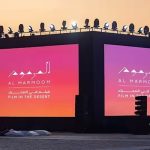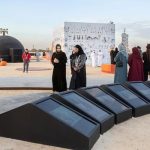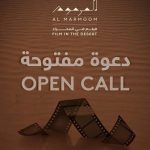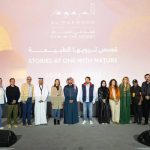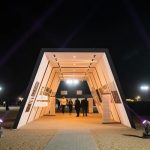The festival has brought together emerging and established artists and filmmakers to reflect their visions of ‘Stories at One with Nature.’
The second edition of ‘Al Marmoom: Film in the Desert’ festival organised by Dubai Culture & Arts Authority (Dubai Culture) at the Al Marmoom Desert Conservation Reserve showcased a diverse and culturally rich spectrum of Arab stories through the films screened.
In line with the vision of Sheikh Mohammed bin Rashid Al Maktoum, Vice President and Prime Minister of the UAE and Ruler of Dubai, to cement Dubai’s position as a global centre for culture, an incubator for creativity and a thriving hub for talent, Dubai Culture launched the ‘Al Marmoom: Film in the Desert’ festival in 2020, providing the community with an innovative cinematic experience in the open air within a unique, educational family atmosphere.
This year’s edition, which concluded on December 11, allowed the audience and movie enthusiasts to delve into the region’s rich history, long-standing traditions, and contemporary vibes. It meaningfully showcased nostalgic issues related to identity and offered eloquent insights that reflect the remarkable diversity of the Arab culture.
Shaikh Maktoum Marwan Al Maktoum, Project Manager of ‘Al Marmoom: Film in the Desert’ festival and Senior Officer in the Projects & Events Department at Dubai Culture, said: “The films showcased at the second edition of the festival were diverse and highlighted societal issues. The stories allowed the audience to learn about our authentic cultural heritage—a heritage that deserves to be shared with the world. The collection of films was a window to innovative narrative experiences. They exhibited our youth’s creativity and artistic techniques, highlighting their competence and perspectives.”
Shamma Yahya Alzaffin, Project Manager of ‘Al Marmoom: Film in the Desert Festival’ and Senior Officer of the Arts & Literature Sector’s CEO’s office at Dubai Culture, highlighted the importance of the festival’s distinguished works that educate, entertain and inspire the audience. She added: “The festival is an innovative idea to give filmmakers an exciting opportunity and a platform to present inspiring works that reflect their perspectives and draw attention to community issues. This confirms Dubai Culture’s keenness to explore new experiences and experimental cinema.”
Over three days, the festival screened 27 films—both feature films and films shortlisted for the Al Marmoom Short Film Competition. The feature films showcased included Honey Rain and Dust by Emirati Filmmaker Nujoom Alghanem. In the movie, she tells the stories of three of the most famous honey collectors in the UAE. It begins with the story of Ghareeb, a beekeeper who established a protective sanctuary at the top of the mountains where he can better manage the environs and protect his honeybees. The story then moves on to Fatima and Aisha, who prefer to roam the mountains freely to find the highest natural honey.
Through her movie Costa Brava, Lebanon, Lebanese director and screenwriter Mounia Akl sought to tell the story of a family that decides to leave Beirut to live in nature. The parents believe they are saving their children from years of suffering living in the city. Nadine Labaki, Saleh Bakri, and Youmna Marwan star in this work, which Lebanon nominated for the Academy Awards.
Osha’s Gift, a short narrative film by Emirati director Hind Abdullah seeks to introduce therapy through art and showcase how loyalty to friends remains after their departure. The film is based on the true story of the young Emirati visual artist Ashwaq, who lost her old friend, Hind, and highlights her new friendship with the child Osha.
Through her short film Why is my grandfather’s bed in our living room? Emirati director Sarah Al Hashemi tells the story of a family that lost their grandfather’s house to development plans. While its members remember their loss, an old wooden bed appears in the middle of the hall, representing the only remaining memory of the house.
The short documentary The Marshes of Iraq by director Ali Mohammed Al Hamami presents the history of the marshes, the stories of that region and, through real testimonies, an image of the close connection between the people and the land.
The festival’s second edition also witnessed 23 specialised talks and workshops to promote local cinema.










































































